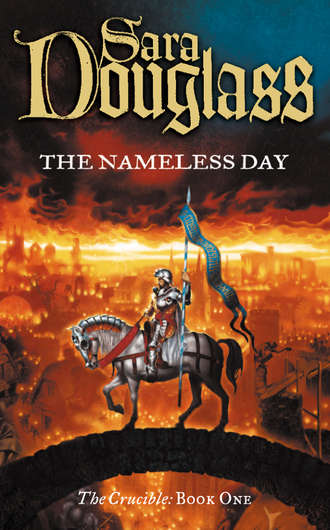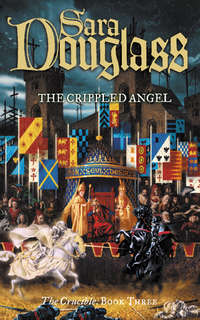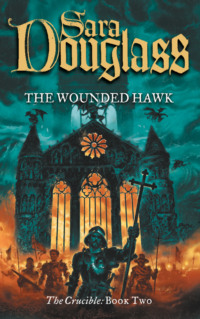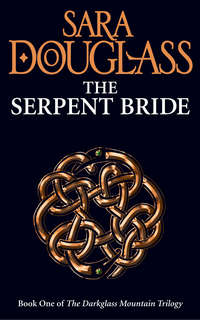
Полная версия
The Nameless Day
Wynkyn spoke, his feverish tongue fumbling over some of the words, but that did not matter, because even as he fumbled, he felt the power of the incantation and the power of all the angels flood creation.
St Michael lifted his hands from Wynkyn’s face and shrieked, and with him shrieked the heavenly host.
The man shrieked also, his movements now most horrid and vile. His wife screamed and tried desperately to push away her husband.
But it was too late.
Far, far too late.
Wynkyn’s successor had been conceived.
The friar blinked. The archangel and his companions had gone, as had the incantation on the page before him.
He was alone again in his cell, and all that was left was to die.
Or, perhaps, to try and perform his duty one last time.
Wynkyn set out the next morning just after Matins, shivering in the cold, dawn air. It lacked but a few days until the Nativity of the Lord Jesus Christ—although Wynkyn doubted there would be much joy and celebration this year—and winter had central Europe in a tight grip.
He coughed and spat out a wad of pus- and blood-stained phlegm.
“I will live yet,” Wynkyn murmured. “Just a few more days.”
And he grasped his staff the tighter and shuffled onto the almost deserted road beyond the city’s northern gate.
It had not been shut the previous night. No doubt the gatekeeper’s corpse lay swelling with the gases of putrefaction somewhere within the gatehouse.
The wind was bitter beyond the shelter of the streets and walls, and Wynkyn had to wrap his cloak tightly about himself. Even so, he could not escape the bone-chilling cold, and he shivered violently as he forced one foot after the other on the deserted road.
“Pray to God I have the time,” he whispered, and for the next several hours, until the sun was well above the horizon, he muttered prayer after prayer, using them not only for protection against the devilry in the air, but also as an aid in his journey.
If he concentrated on the prayers, then he might not notice the crippling cold.
Even the sun rising towards noon did not warm the air, nor impart any cheer to the surrounding countryside.
The fields were deserted, ploughs standing bogged in frozen earth, and the doors of abandoned hovels creaked to and fro in the wind.
There was no evidence of life at all: no men, no women, no dogs, no birds.
Just a barren and dead landscape.
“Devilry, devilry,” Wynkyn muttered between prayers. “Devilry, devilry!”
By mid-afternoon Wynkyn was aching in every joint, and shaking with fatigue. His cough had worsened, and pain hammered with insistent and cruel fists behind his forehead.
“I am so old,” he whispered, halting for a rest beneath a twisted tree stripped bare of all its leaves. “Too old for this. Too old.”
A fit of coughing made the friar double over in agony, and when Wynkyn raised himself and wiped bleary tears from his eyes, he only stared in resignation at what he saw glistening on the ground between his feet.
No phlegm at all now. Just blood…and thick yellow pus.
An hour before dusk, almost frozen yet still shaking with fever, Wynkyn turned onto an all but hidden small track that led north-east. Stands of shadowed trees had sprung up to either side of the road in the last mile, and the track led deeper into the woods.
The trees had been stripped of leaves by the winter cold, and moisture and fungus crept along their black branches and hung down from knobbly twigs. Boulders reared out of the moss-covered ground, tilting trees on sharp angles. Cold air eddied between trees and boulders, carrying with it a thin fog that tangled among the treetops.
No one ever ventured into these forbidding woods. Not only was their very appearance more than dismal, but legend had it that demons and sprites lingered among the trees, as did goblins among the rocks, all more than ready to snatch any foolish souls who ventured into their domain.
Wynkyn would have chuckled if he had had the energy. For hundreds of years the Church had cautioned people away from these woods with their tales of red-eyed demons. Red-eyed demons there were none, but Wynkyn knew the reality was worse than the stories.
These woods nurtured the Cleft.
He struggled along the track, stopping every ten or twelve steps to lean against the trunk of a tree and cough.
Wynkyn knew he was dying, and now the only question left in his mind was whether or not he could open the Cleft and dispose of this year’s crop of horror before he commended his soul to God.
After another mile the ground began to rise to either side of the path. Yet another half mile and Wynkyn, his legs so weak he had to lean heavily on a staff to keep upright, found himself at the mouth of a gorge. The hills to either side were not over tall—perhaps some six or seven hundred feet—but the gorge floor dropped down into…well, into hell itself.
This was the Cleft, the earth’s vile equivalent of the suppurating cleft that lay between the legs of every daughter of Eve.
Wynkyn began to laugh, a harsh yet whispery sound. As loathsomeness would be sunk into the cleft of every one of the daughters of Eve, so he, Wynkyn de Worde, would see to it that loathsomeness would be sunk into this Cleft.
Every cleft led to hell, one way or the other.
Wynkyn’s laughter turned into an agonising, wet, bubbling cough, and he sank to his knees and would have fallen completely had it not been for his grip on his staff. The pestilence had run riot in his lungs, and now Wynkyn was very close to drowning in his own pus and blood.
Time was passing too fast. He did not have long.
Praise God he knew the incantations by heart!
Wynkyn forced himself to raise his head. He spat out an amount of pus, hawked, spat again, then wiped his mouth with a shaking arm.
It was time.
Slowly he spoke the words, his eyes fixed on the Cleft.
When he finished, it first appeared that nothing had changed. The gorge spread before him in the twilight, a twisted wasteland of boulders and shadows and the hunched shapes of low, scrubby bushes.
But in an instant all altered. Flames licked out from behind boulders, and vegetation burst into fire. There was a roaring, rending sound, and clouds of sulphuric effluvium billowed into the air.
Wails and screams, and even the thin, white, despairing arms of those trapped within, rose and fell from the gate to hell.
Wynkyn chuckled. The Cleft had opened.
But his work was not yet done. He turned slightly so that he could see the path behind him.
“Come,” he said, and clicked his fingers. “Come.”
There was a momentary stillness, then from the forest lining the path walked forth children, perhaps some thirty or thirty-five, all between the ages of two and six.
Not one of them was human and all were horribly deformed; the twistings of their bodies reflecting the twistings of their souls.
Wynkyn bared his teeth. They were abominable! Devilish! And to the Devil they must be sent.
He lifted his hand, trying to control its shaking, and began to speak the incantation that would force them down into—
A convulsion racked his body, and his voice wavered and stilled.
Another convulsion swept over him, and Wynkyn de Worde collapsed to the ground.
One of the children, a boy of about six, stepped forth to within a few paces of the friar.
Wynkyn rolled over slightly, his face contorted, and began to whisper again.
The boy smiled.
Wynkyn’s voice bubbled to a close. He lifted a hand trying desperately to conjure words out of air, but nothing came of it, and his hand fell back to the ground, failing him as badly as his voice.
“You’re dying,” said the boy, his voice a mixture of relief and joy.
He turned and looked at the crowd of his fellows. “The Keeper dies!” he said.
Behind him Wynkyn writhed and twisted, fighting uselessly against his illness. He tried to breathe, but could not…he could not…the fluids in his lungs had bubbled to his very throat and…
The boy turned back to Wynkyn as the friar made an horrific gurgling. The old man was trembling, and odorous fluids were running from his mouth and nose.
His eyes were wide and staring…and very, very afraid.
“If I had the strength,” the boy said in a voice surprisingly mature for his age, “I would throw you into the Cleft myself.”
But he could not, and so the boy stood there, his fellows now ranged behind him in a curious and joyful semicircle, and watched as Wynkyn de Worde struggled into death.
They waited for some time after his last breath. Making sure.
They waited until the Cleft closed of its own accord, tired of waiting for the incantation that would have fed it.
They waited until the boy at their head leaned down and retrieved the key that hung from the dead friar’s belt.
They waited until the curse of the Nameless Day was past.
“Hail our freedom!” he cried, and then burst into laughter. “We are freed of the angels’ curse. Freed into life!”
And he thrust the key nightward in an obscene gesture towards Heaven.
It was a cold night.
Worse, it was the most feared time of year, for all knew that during the winter solstice the worlds of mankind and demon touched and a passage between them became possible. In ancient times the people had called this day and night period the Nameless Day, for to name it would only have been to give it power. Even though the people now had the word of God to comfort them, they remembered the beliefs of their ancestors, and each year feared that this Nameless Day might witness the escape of Satan’s imps into their world.
The villagers of Asterladen—those the pestilence had spared—huddled about a roaring fire inside the church. It was the only stone building in the village, and the only building with stout doors which the villagers could lock securely.
It was the safest place they could find, and the only sound which could comfort them was the murmured prayers of their parish priest.
Rainard, his wife Aude, and their infant daughter were particularly unlucky. That afternoon they had remained behind in the fields when the other villagers left, trying to discover the brooch that Aude had dropped in the mud.
It was her only piece of finery, a simple brooch made of worn bronze which had been passed down through her family for generations, and Aude was singularly proud of it. Normally she would not have worn it out to the fields, but there was to be a field dance that afternoon, and the lord had promised ale, and Aude wanted to look her best. Despite her age and her many years spent childbearing, Aude was a vain creature and proud of her looks. But between the dancing and the ale, the brooch had somehow slipped from her breast to be trodden down into the earth. She and Rainard—he berating her the entire time for her foolishness in wearing her only piece of jewellery into the field even for a Yuletide dance—had searched for hours, but the brooch was nowhere to be found.
Too late they realised the onset of dusk, and the absence of every other soul.
They hurried back to the village, breathless and fearful, and had beaten on the doors of the church until their fists were bruised and bloody.
But the priest had called them demons, and the villagers safe inside the church had screamed and refused to believe that the voices of their well-known friends were human at all.
So Rainard and Aude and their infant daughter, whom Aude had left swaddled and safe in their cottage while they were out in the fields, had to survive the night on their own.
Rainard built up a good fire in the central hearth of their cottage, and he and his wife huddled as close to it as they could, listening all the while to the moans and cries in the wind outside.
“There’ll be no harm,” Aude muttered, convincing neither her husband nor herself. She threw a concerned glance to her daughter, lying asleep in her cradle.
“We would be safe if not for your cursed trinket,” Rainard said.
Aude bared her yellowing teeth, but said nothing. She grieved deeply for her lost brooch, and wondered if somehow Rainard had been involved in its loss.
What if he had seized it in order to sell it next market day in Nuremberg? Like as not he would squander her money on a new couplet of pigs, or some such! Yes, perhaps he had it even now, tucked away in some—
There was a sudden noise on the wind, the sound of a distant door being forced open, and then of feet scuffling past the back wall of their cottage.
Some of the feet clicked, as if they were clawed.
“Rainard!” Aude squeaked, and leapt into her husband’s arms.
He shoved her to one side, and seized an axe he had to the ready.
More feet scampered past, bolder now, and the couple thought they heard the sound of three or four more doors in neighbouring cottages being forced open.
“Rainard!” Aude screamed, grabbing at his arm.
And then the door of their hovel squeaked and fell open.
Rainard and Aude stared, not believing their eyes.
A child, a boy, stood there. He was weeping, and covered with dirt and abrasions.
Nonetheless, he was the most beautiful child the peasants had ever seen.
“Who are you?” Rainard said, wondering how the child had escaped the prowling demons.
The boy gulped, and began to cry. “I’m lost,” he eventually said.
Rainard and Aude looked at each other. They’d heard tales of these waifs, orphaned by the pestilence, turned out of their homes by neighbours who thought the children harboured pestilence themselves.
But although this boy was cold and dirty, he was also obviously healthy. His eyes shone clear and bright, and his skin, if dirty, was not feverish.
“What is your name?” Aude said.
“I have no name,” the boy said.
“Then where are your parents?” Rainard said.
“My mam is dead, and my father deserted us years ago,” the boy said. “Before I was born. I know not where he is. Please, I am hungry. Will you feed me?”
There was a shuffling behind him, and two girls, perhaps three and four respectively, silently joined the boy.
“How many of you are there?” Rainard asked.
“Us, and two more, both girls,” said the boy. “Please, we have all lost our parents, and are hungry. Will you feed us?”
Rainard and Aude shared a look. They were poor and had barely enough to feed themselves, but they also had souls, and cared deeply for children. God knew there were few enough left in this time of pestilence.
“We’ll take you,” Rainard said, pointing to the boy, “and one of the girls. The others can find homes soon enough with some of the other families.”
The boy smiled, his face almost angelic. “I do thank you,” he said.
He moved over to the cradle, and both Rainard and Aude stiffened.
But the boy did nothing more than reach in and gently touch the sleeping girl’s forehead. “She will lead a charmed life,” he said.
Over that night and the next two days twelve villages in the region north of Nuremberg found themselves sheltering hungry orphans. No one was particularly puzzled by the appearance of the children: communication between villages was poor, and there was no one to learn of the somewhat surprising number of hungry, soulful-looking children who appeared at doors asking for shelter in the time of the Nativity in the year of the black pestilence.
This was a time of unheard-of disease and death, and there must surely be orphaned children wandering about all over the land.
All the children were taken in and nourished, and loved, and raised. None of these children bit the hands that fed them; to these work-worn hands they gave back love and gratefulness and good works.
All of these children eventually left their adopted homes to lead particularly bounteous lives.
ROME
“Margrett, my sweetest Margrett! I must goe!
most dere to mee that neuer may be soo;
as Fortune willes, I cannott itt deny.”
“then know thy loue, thy Margrett, shee must dye.”
A Jigge (for Margrett)
Medieval English ballad
I
The Friday after Plough Monday
In the forty-ninth year of the reign of Edward III
(16th January 1377)
A dribble of red wine ran down Gerardo’s stubbled chin, and he reluctantly—and somewhat unsteadily—rose from his sheltered spot behind the brazier.
It was time to close the gates.
Gerardo had been the gatekeeper at the northern gate of Rome, the Porta del Popolo, for nine years, and in all of his nine years he’d never had a day like this one. In his time he’d closed the gates against raiders, Jewish and Saracen merchants, tardy pilgrims and starving mobs come to the Holy City to beg for morsels and to rob the wealthy. He’d opened the gates to dawns, Holy Roman armies, traders and yet more pilgrims.
Today, he had opened the gate at dawn to discover a pope waiting.
Gerardo had just stood, bleary eyes blinking, mouth hanging open, one hand absently scratching at the reddened and itching lice tracks under his coarse woollen robe. He hadn’t instantly recognised the man or his vestments, nor the banners carried by the considerable entourage stretching out behind the pope. And why should he? No pope had made Rome his home for the past seventy years, and only one had made a cursory visit—and that years before Gerardo had taken on responsibility for the Porta del Popolo.
So he had stood there and stared, blinking like an addle-headed child, until one of the soldiers of the entourage shouted out to make way for His Holiness Pope Gregory XI. Still sleep-befuddled, Gerardo had obligingly shuffled out of the way, and then stood and watched as the pope, fifteen or sixteen cardinals, some sundry officials of the papal curia, soldiers, mercenaries, priests, monks, friars, general hangers-on, eight horse-drawn wagons and several score of laden mules entered Rome to the accompaniment of murmured prayers, chants, heavy incense and the flash of weighty folds of crimson and purple silks in the dawn light.
None among this, the most richest of cavalcades, thought to offer the gatekeeper a coin, and Gerardo was so fuddled he never thought to ask for one.
Instead, he stood, one hand still on the gate, and watched the pageant disappear down the street.
Within the hour Rome was in uproar.
The pope was home! Back from the terrible Babylonian Captivity in Avignon where the traitor French kings had kept successive popes for seventy years. The pope was home!
Mobs roared onto streets and swept over the Ponte St Angelo into the Leonine City and up the street leading to St Peter’s Basilica. There Pope Gregory, a little travel weary but strong of voice, addressed the mob in true papal style, admonishing them for their sins and pleading for their true repentance…as also for the taxes and tithes they had managed to avoid these past seventy years.
The mob was having none of it. They wanted assurance the pope wasn’t going to sally back out the gate the instant they all went back to home and work. They roared the louder, and leaned forward ominously, fists waving in the air, threats of violence rising above their upturned faces. This pope was going to remain in Rome where he belonged.
The pope acquiesced (his train of cardinals had long since fled into the bolted safety of St Peter’s). He promised to remain, and vowed that the papacy had returned to Rome.
The mob quietened, lowered their fists and cheered. Within the hour they’d trickled back to their residences and workshops, not to begin their daily labour, but to indulge in a day of celebration.
Now Gerardo sighed, and shuffled closer to the gate. He had drunk too much of that damn rough Corsican red this day—as had most of the Roman mob, some of whom were still roaming the streets or standing outside the walls of the Leonine City (the gates to that had been shut many hours since)—and he couldn’t wait to close these cursed gates and head back to his warm bed and comfortable wife.
He grabbed hold of the edge of one of the gates, and pulled it slowly across the opening until he could throw home its bolts into the bed of the roadway. He was about to turn for the other gate when a movement in the dusk caught his eye. Gerardo stared, then slowly cursed.
Some fifty or sixty paces down the road was a man riding a mule. Gerardo would have slammed the gates in the man’s face but for the fact that the man wore the distinctive black hooded cloak over the white robe of a Dominican friar, and if there was one group of clergy Gerardo was more than reluctant to annoy it was the Dominicans.
Too many of the damn Dominicans were Father Inquisitors (and those that were not had ambitions to be), and Gerardo didn’t fancy a slow death roasting over coals for irritating one of the bastards.
Worse, Gerardo couldn’t charge the friar the usual coin for passage through the gate. Clergy thought themselves above such trivialities as paying gatekeepers for their labours.
So he stood there, hopping from foot to foot in the deepening dusk and chill air, running foul curses through his mind, and waited for the friar to pass.
The poor bastard looked cold, Gerardo had to give him that. Dominicans affected simple dress, and while the cloak over the robe might keep the man’s body warm enough, his feet were clad in sandals that left them open to the winter’s rigour. As the friar drew closer, Gerardo could see that his hands were white and shaking as they gripped the rope of the mule’s halter, and his face was pinched and blue under the hood of his black cloak.
Gerardo bowed his head respectfully.
“Welcome, brother,” he murmured as the friar drew level with him. I bet the sanctimonious bastard won’t be slow in downing the wine this night, he thought.
The friar pulled his mule to a halt, and Gerardo looked up.
“Can you give me directions to the Saint Angelo friary?” the friar asked in exquisite Latin.
The friar’s accent was strange, and Gerardo frowned, trying to place it. Not Roman, nor the thick German of so many merchants and bankers who passed through his gate. And certainly not the high piping tones of those French pricks. He peered at the man’s face more closely. The friar was about twenty-eight or nine, and his face was that of the soldier rather than the priest: hard and angled planes to cheek and forehead, short black hair curling out from beneath the rim of the hood, a hooked nose, and penetrating light brown eyes over a traveller’s stubble of dark beard.
Sweet St Catherine, perhaps he was a Father Inquisitor!
“Follow the westerly bend of the Tiber,” said Gerardo in much rougher Latin, “until you come to the bridge that crosses over to the Castel Saint Angelo—but do not cross. The Saint Angelo friary lies tucked to one side of the bridge this side of the river. You cannot mistake it.” He bowed deeply.
The friar nodded. “I thank you, good man.” One hand rummaged in the pouch at his waist, and the next moment he tossed a coin at Gerardo. “For your aid,” he said, and kicked his mule forward.
Gerardo grabbed the coin and gasped, revising his opinion of the man as he stared at him disappearing into the twilight.
The friar hunched under his cloak as his exhausted mule stumbled deeper into Rome. For years he had hungered to visit this most holy of cities, yet now he couldn’t even summon a flicker of interest in the buildings rising above him, in the laughter and voices spilling out from open doorways, in the distant rush and tumble of the Tiber, or in the twinkling lights of the Leonine City rising to his right.
He didn’t even scan the horizon for the silhouette of St Peter’s Basilica.







